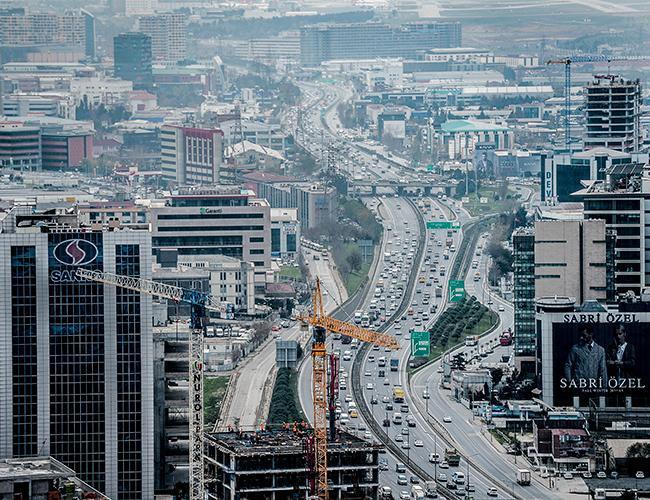
‘Neoliberal Turkey and its Discontents: Economic Policy and the Environment under Erdoğan,’ edited by Fikret Adaman, Bengi Akbulut and Murat Arsel (IB Tauris, 273 pages, $99)
Recent forced resignations of many ruling Justice and Development Party (AKP) mayors hint at power struggles rumbling under the surface. Kadir Topbaş’s departure as Istanbul mayor last month came after infighting between his office and AKP members of the city council over zoning plans and financial resources. He is said to have been resisting five lucrative construction projects that council members wanted to pass.
 Turkey’s municipal administrations are prime sites for rent-seeking and graft. They are also increasingly important purse-strings for the government, cementing itself in place and the prestige of parliament dwindles. Whoever controls municipalities controls a useful tranche of resources that can be doled out to loyal constituencies. Cultivating networks for rent distribution, lucrative projects, and a grandiose narrative of infrastructure development are at the core of the governing model. Take away shiny megaprojects – like the massive new airport and the “crazy” plan to build a second Bosphorus in Istanbul - and you take away a large chunk of the AKP’s political raison d’etre.
Turkey’s municipal administrations are prime sites for rent-seeking and graft. They are also increasingly important purse-strings for the government, cementing itself in place and the prestige of parliament dwindles. Whoever controls municipalities controls a useful tranche of resources that can be doled out to loyal constituencies. Cultivating networks for rent distribution, lucrative projects, and a grandiose narrative of infrastructure development are at the core of the governing model. Take away shiny megaprojects – like the massive new airport and the “crazy” plan to build a second Bosphorus in Istanbul - and you take away a large chunk of the AKP’s political raison d’etre.
The question of Turkey’s troubled development model is examined in “Neoliberal Turkey and its Discontents: Economic Policy and the Environment under Erdoğan.” A collection of essays edited by Boğaziçi University Professor Fikret Adaman, researcher Bengi Akbulut and Erasmus University Associate Professor Murat Arsel, it is a largely illuminating book.
The AKP’s continued success has depended on economic growth. But equally important is the way that perceptions of this growth have been shaped by mammoth construction and energy projects. This fits neatly into the government’s civilizational narrative, in which megaprojects elevate Turkey to its rightful place among great nations. As contributor Hande Paker writes, Istanbul’s new third airport aims to “symbolize the power of the Turkish state and Istanbul as a global city,” winning international prestige and “increasing the respectability of Turkey in the world.”
These projects are not simply an exercise of state capacity working with social actors to develop infrastructure. In Turkey, megaprojects allow the government to build power, channeling funds to loyal supporters while promoting "services for the people." Awe-inspiring megaprojects are also “presented as the epitome of services” and are used to block any criticism.
In the introduction to the collection, the editors refer to nostalgia for an imagined Ottoman ideal as a motivating force for an idea of development primarily defined in terms of material accumulation. For Islamists, they write, the Ottoman Empire “demonstrated the necessity of economic and military might for furthering the cause of Islam.” Explicitly or not, this assumption underlines much of the fanfare surrounding landscape-defining megaprojects over the past 20 years.
The link between the AKP’s development model and bitter political divides is examined in a perceptive piece on environmental activism by Adaman, Akbulut and Arsel. The article describes how environmental concerns and warnings about the negative effects of concrete fetishization inevitably clash with the government’s narrative of national glory. Environmental campaigners are thus routinely accused of trying to undermining the state, “unwitting servants of various internal and external enemies of Turkey or, at worst, working directly for them to destroy the AKP and the country as a whole.” All this dovetails with the class aspect of the AKP’s culture war, as the environment is generally seen as an upper middle-class issue, far from the concerns of “ordinary” voters.
But the collection would be better if it engaged with those concerns a little more deeply. Many voters opted for the AKP and Erdoğan as they saw them as responsible for rising living standards through the 2000s. The extension of health insurance and health services to broader masses was one of the positive effects that many associate with the AKP. Megaprojects would seem like absurd indulgences (and may yet come to be seen as such) if they were not undergirded by tangible day-to-day benefits. Any assessment of Turkey’s economy that underestimates this aspect is incomplete.
“Neoliberal Turkey and its Discontents” is explicitly focused on the grim environmental effects of the past 20 years, so a certain imbalance is understandable. Looming over the book is the specter of Kanal Istanbul. Environmental experts have issued apocalyptic warnings about the dangers of building a second Bosphorus Strait from the Black Sea to the Marmara Sea, effectively turning much of Istanbul into an island. But last week President Erdoğan pledged to push ahead with his “dream,” vowing that groundbreaking would take place by the start of 2018. If that project does go ahead, a city that is already barely livable may be tipped over the edge.
* Follow the Turkey Book Talk podcast via iTunes here, Stitcher here, Podbean here, or Facebook here, or Twitter here.